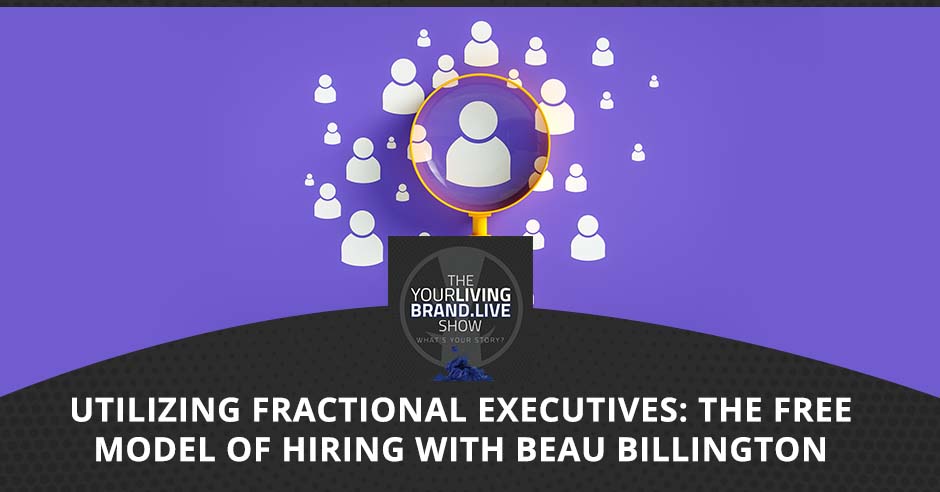
The recruiting world is changing. We are transitioning out of the old and into a free model, where people are hired to fill positions for a certain amount of time. And fractional executives are making their presence felt with their ability to work themselves out of a job after maximizing value, making sense of the chaos, and leading companies to the next step. Talking about this shift, Ben Baker sits down with the founder of The Free Agent, Beau Billington, about the rise and advantages of utilizing fractional executives. Beau discusses how companies can attract and hire talent and what qualities they need to look for to help them achieve their goals. Likewise, he also offers some pointers for consultants looking to get hired. In these unprecedented times, fractional executives are starting to become the solution companies need—independent agents who fix problems rather than play politics. Tune into this conversation to learn more!
—
Listen to the podcast here

Utilizing Fractional Executives: The Free Model Of Hiring With Beau Billington
[00:01:02] Thank you for coming back week after week, sharing and commenting on LinkedIn. Thank you for emailing me at Ben@YourBrandMarketing.com. I love your comments and your passion. I love the fact that you come back week after week. Thank you, my wonderful audience. In this episode, we are going to talk about innovative ways that looking at recruiting. Recruiting is changing. It should and needs to change. I brought a great guest, Beau Billington from The Free Agent. We’re going to talk about what we need to do to be innovative in the way that we recruit and be able to put ourselves in the best shape forward, moving forward. Beau, welcome to the show.
[00:01:47] Ben, I’m super glad to be here. Thanks for having me on. The world of recruiting is crazy. I’ve been in the business for years. I have seen a change from when I first started until this point. It’s an interesting topic, near and dear.
[00:02:01] It’s my pleasure. What brought you into the recruiting world? You’ve been in it for years, which doesn’t seem a long period but it is when we take a look at how the industry has progressed, how digital and innovative it has become and how disruptive it is as much as I hate the word disruptive, which everybody knows but as it’s changed, what brought you into the industry? Let’s talk about where we are.
[00:02:29] I will say the fact that I’ve only been in the industry and didn’t come from the industry. If it’s been years, I feel like that’s my superpower. I feel like my organization and company come in. We look at recruiting from a different perspective with the total goal of aiming to disrupt the industry, which has been primed for disruption for many years. In regards to your question on how I got started, prior to jumping out, I was in Corporate America software sales and services for a better part of seventeen years, selling to the Fortune 50. Typically, I’m working for international companies. I got burnt out with the travel, had a kid, built a house and wanted to find a different reality for me.
You’re Canadian so you could probably resonate with this but I had my first daughter. I was in Toronto about 3 or 4 days before Christmas. Luckily, I was going to be snowed in and not make it back. Candidly, I was only in Toronto because somebody told me to be there. I was sitting there at the restaurant. In the background, ESPN came on and said, “So-and-so is a free agent.”
I thought to myself, “How cool is that? Why can’t I be a free agent? I essentially work for 3 or 4 companies over the course of the year, work on my terms and ultimately jump out of Corporate America.” That spawned the concept of The Free Agent. It took me 2 to 3 years while working in Corporate America to suss out what we do and how we do it. Upon garnering that confidence and also realizing that I could never have a side hustle alongside a main hustle, I made the hard decision in April of 2017 and jumped out. Years later, I’m here talking to you.

[00:04:04] I love the free agent mentality. I’ve been on my own one way, shape or form for many years but truly what we are in a lot of cases is we’re advocates for our clients. We go in there and dig deep. We’re sitting there in a fractional communication officer-type position where they’re going, “How do you work internally, be there side by side, instead of being this vendor that comes in, charges them a lot of money, gives them a report and walks away?”
I get it being part of 3, 4 or 5 different organizations, seeing a breadth of situations, seeing what’s going out of the market makes you more valuable to the other 4 because you’re going to see things in 1 place that you could utilize in the different location. I love the fractional model. I believe in it. It’s the way that it should be in terms of a lot of businesses.
[00:04:58] To add to what you mentioned, what I’ve enjoyed about being on my own is I feel I’m in a position and empowered to provide real value to my customers. When I worked for other companies, a lot of the time, they looked for a customer to fit perfectly within this box. Anything outside of the box, we don’t do that, pass to a partner, even though maybe it was caused by tangential to what we did and we could service them in theory.
I had a problem with that because I like to get creative. I like to sit down with my customers and figure out a way to help them fix their gaps or issues. I’m a free agent and have my own business. I am in a position. I feel to provide more value, hold the hands of my customers and see how we can help them versus saying, “We don’t do that. Sorry, good luck. Find somebody else.”
[00:05:42] It’s being a problem solver. That is what everybody needs. People need people who can help them solve problems, not solve the problems for them but people who can come in and teach them how to fish instead of fishing for them. That’s an important thing to sit there and say, “I’m going to show you how to hold the real, cast and pull the fish in. I’ll do it for you a couple of times. After that, I’m going to pull back a little bit, watch you, coach you a little bit and then walk away. If you have problems, I’m still going to be here.” It’s all about teaching other people how to succeed. I love that thought process.
[00:06:22] That’s the essence of The Free Agent model. I always tell people that if we’re talking about contractual engagement, the goal of any free agent or interim executive for that matter is to work themselves out of a job. You don’t want somebody who’s there for 1, 2, 3, 4 or 5 years. Candidly, if they’re doing that, I feel like they’re skating through underneath the radar but their goal should be to come in, maximize value, maximize ROI and lead them to the water. Ultimately, get out of the way, teach them how to fish and move on to the next engagement.
The goal of any free agent or interim executive is to work themselves out of a job. Share on X[00:06:54] On that front, you could also be the person who makes the mess, cleans it up and hands it off to somebody else. The person that comes in when it is messy, there’s real chaos going on and change needed to be in is not usually the person that’s going to be loved all the time. They’re not always going to be the person who’s everybody’s best friend because they got to make the hard decisions to be able to make sure that things are successful moving forward.
A lot of times, these fractional people are great because you can bring them in. Let them do what they do best, which makes sense out of the chaos. Move everything in the right direction and be able to say, “You need somebody who can sit there and manage everything that we put forward.” That’s not me. That’s not my skillset. My skillset is to make chaos, clean it up and hand it off. It’s being able to understand what is the skillset of the people that you’re bringing in and making sure that they’re successful and you’re successful at the same time.
[00:07:53] The beauty of the interim management consultant is the fact that they’re objective advisors, observers or whatever you want to call it. A lot of times, people within their organizations are trying to fix something that’s broken. It’s generally a myopic view, similar to how developers don’t work on their code. They bring in a separate party, IEQA, to evaluate the software that’s built. I’m a big believer in the management consulting model because you are bringing in an outside resource that may know your business, may not know your business, may know your industry or may not but ultimately, they’re independent and their goal is to fix the problem versus to play politics or whatever scenario may happen within a medium to large size company.
[00:08:33] Let’s get into something you said, “Maybe they know your business. Maybe they don’t know your business.” I’m finding that there are a lot of companies out there saying, “I want somebody who’s done ten years of experience doing this specific exact thing for this specific type of company before I’m willing to bring it in.” That’s very myopic. I’d love to hear your viewpoints on that.
[00:08:56] It’s a great point. It depends on the actual situation. Some industries are so niche. The nuances are so great and bringing an insider does make sense. I talked to an architectural software firm. That’s a very specific product. There are other scenarios where I feel maybe the industry is broader and could leverage an executive that has experience in an adjacent market set.
It depends on the exact scenario and also on what type of discipline you’re hiring for. Is it sales, operations, finance or technology? If you’re thinking more about the finance and operations silo, sometimes numbers are numbers. Sometimes they’re not. If you’re talking sales, in my opinion, a lot of times coming from the same industry does make some sense or at least an adjacent industry.

[00:09:45] The thing is to sit there and say, “Does the person have the skill set to learn?” I always find that being curious as that outside voice coming in is probably the biggest superpower you have. Sometimes it’s the fact that you don’t know what you don’t know and you’re being the one who’s willing to ask the hard questions that everybody else assumes everybody knows the answer to. It opens up conversations that no one else was willing to have. It’s a matter of sitting there going, “How open are companies to change or are they looking for someone who can manage the chaos as it’s going out?” It’s a matter of sitting there going, “What are we trying to achieve?”
[00:10:25] Having an innate curiosity is a big component of what makes an executive consultant successful or not. Having enough finesse to have an executive team that listens to you takes further into a point regarding soft skills at some point. Sometimes, experience is at parody across these executives. They’ve all managed big teams, done this, done that. Part of our goal and job is to make sure that the soft skills that these individuals possess integrate well with the executive team. That’s a big component because if that’s not aligned or misaligned, you’re dead from go.
[00:11:02] It’s understanding the culture. You got to understand what’s the situation you’re walking into. What are the politics? Who are the personalities involved? What are the real problems? What are the underlying problems?
[00:11:14] It is so tough because most people talk about their businesses as, “Yes, everything’s great and perfect. We don’t have any issues.” I always ask, “Why are we talking?” It’s tough to get to that next level of what the real underlying issues are. Candidly, if I never get to that point with a company, I’m not going to work with them. That’s not a knock on them but I wouldn’t be effective at my job if everything is perfect and rosy. We’re unable to talk about where the bodies are buried. That’s what we needed to discuss. They need to be vulnerable. Similarly, if we’re talking about attracting talent.
If companies aren’t honest as well with the talent, they’re not going to track the folks they want. We need to be in a position where we can understand the company. They’re vulnerable and transparent, not only with us but also with the folks that we bring to the table because otherwise, you’re not going to track the caliber of individuals that are going to help you get to that next level.
[00:12:04] That’s a great transition because I wanted to bring up two things. One at the very beginning, you talked that over the five years that you’ve been in the business, you’ve seen dramatic change and I want to get into that. The second part that I want to get into is what is the process that we need to be able to look at.
If companies aren't honest with the talent, they're not going to track the folks they want. Share on XMoving forward in a good economy and a bad economy, what are the things that we need to be thinking about when we’re going through the hiring process? As things change, what are the things that are going to be important moving forward? What are the things that have been important in the past that no longer apply? Let’s get into the first thing and we can circle back to that.
[00:12:46] In regards to your first question about how things have changed, over the last few years, it’s been a roller coaster, honestly. When I first started, I feel like the salary bracket and salary bands were pretty much parodies. Precisely, what job would equate to what salary or what hourly rate? For the record, we do both executive headhunting, as well as interim or fractional consulting work. We see both sides of the coin there but I had a very good feeling as to salary brackets. It was more around overall opportunity because salaries were at parody. You had to suss out with the organizations and the companies where they differentiated in areas outside of salary.
It’s not necessarily an easy job but the salary component was stagnant. You had to do your due diligence with the company and come to the table armed with some interesting points about what they do, how they do it and why somebody would want to work there. If I made it through that, I don’t make it through anything. It was a good time for me. COVID struck and that put everybody into a frenzy and a tailspin. I saw the director above hiring which decrease a little bit and the need for interim executives increased substantially. We have a goal of a 50/50 split. We went from 70/30 at the time of head hunting to contract work to probably about 20/80 split.
[00:14:09] The fractional stuff went way up.
[00:14:11] It went way up because nobody was hiring. It was all around conserving revenue or increasing revenue and cutting costs. Getting rid of nice-to-have roles and ensuring that whoever was brought on could move the cursor in a big way. Having access to interim folks made a lot of sense. Years into that, everybody realized that COVID was not going away. Companies went into a hiring frenzy, which has obliterated the market. It’s made my job a lot harder because previously, salaries were pretty stagnant. Once everyone realized COVID was not going away or ending any time soon, salaries went through the roof. I’m talking 20% to 50%.
You found this void where these big companies and organizations were able to attract talent strictly by the monetary value and dollars. You had this bigger void with these middle-tier companies that couldn’t compete from a salary perspective. It made it quite difficult to find personnel within that middle-tier bracket that was unable to get that 20%, 30% or 40% salary lift. That led us into a situation where you had to do some due diligence in regards to what you can bring to the table.

Is it equity? Is it options? Maybe you’ll find somebody a little bit more junior and give them a little bit more of a senior role to attract them because you couldn’t compete against costs. We’ve been through the ringer. I’m not hoping for a recession but I’m thinking maybe the recession can bring us back to where we were a little bit. I’m not looking for a recession because that’s bad for my business and everybody’s business. It may bring the market back to where it needs to be. It’s been a Wild Wild West. Everybody’s chasing dollars, which is great. A lot of times, these people who were chasing dollars are the ones who are getting laid off.
[00:16:25] The challenges with chasing dollars and titles. I do a lot of coaching and tell these kids, “If all you’re doing is getting a title bump and you’re not getting compensated effectively for what you’re doing, all it is a title. It doesn’t mean anything. If all you’re doing is chasing money, you’re going to be working like a dog forever.” You need to sit there and understand, “How am I being compensated? How am I being valued? Is it all about money?”
No, maybe it’s about looking at different ways that we compensate individuals beyond money. I was talking to somebody. What if once a week you hired somebody to go in and clean somebody’s apartment for them, you had groceries delivered to their place or they didn’t want to drive so you had an Uber show up every morning and take them to the office and back?
[00:17:13] I need somebody to fold my clothes in. I love that idea. That’s a great idea. It’s low cost to the company but adds a lot of value to the worker.
[00:17:21] It’s different ways of looking at it. Instead of that $30,000 to $100,000 bump, you look at something that’s $20,000 and has $75,000 or $80,000 worth of value. There’s a lot of people that sit there going, “I’m time-starved. I don’t have time to do my laundry. I can bring my laundry to the office and somebody will take care of it for me once a week. Somebody will come and clean my house, bring groceries to my house or drive me back and forth to the office.” Figure it out. It can’t be an all-or-nothing type thing. It’s got to be sitting there talking to individual people, sitting there and saying, “What’s going to work for you?”
[00:17:59] This goes back to the point I made about trying to find those added areas where companies compete outside of dollars, helping people have more fulfillment in their work and maybe a better work-life balance. When I first started my career, it is all around money. I was 30, 33 or 34 when I realized it’s not all about money. I have a life and want to be around my kids. Quality of life became supreme.
A lot of times, these people chasing dollars are the ones getting laid off. Share on XI’m going to have my business but if I were looking for a company, I’d have a specific salary that I would need to maintain. Outside of that, it would be interesting to me if I can take my kids to a soccer game, baseball game or practice every week and not miss one, not feel guilty about it and get a call from my boss when he or she knows that I’m going to be with my children.
[00:18:45] Let’s talk about a good economy versus a bad economy and how you would advise corporations in their hiring process in both. Sometimes, we’re going to have a good economy or a bad economy. How do you change your philosophy? Do you change your philosophy in terms of how you go to market, the type of things that you’re offering and the relationships that you’re trying to build with your staff, whether it’s a good economy or bad economy or should it be the same thing?
[00:19:16] I’m going to attack this from a little bit of a different angle but what I’ve seen in a good economy is a lot of companies are hiring full-time employees, which makes sense. Businesses are booming. If you had the cash and capital, why not do that? Conversely, when things like COVID have presented themselves, I’ve seen companies hire fewer full-time employees and ratchet up the consulting side of the house, which makes a lot of sense for a myriad of different reasons.
You can spend money but maybe maximize the output. It depends on the company and the situation. It’s being in tune with what’s going on. A lot of companies have done funding round. They’re laying off all those people that they’ve hired. That’s a bad situation where I feel like they weren’t honest. At some point, there was a trigger that they saw and didn’t want to slow down the hiring. It’s harder decisions earlier. With that being said, good economy, bad economy, the landscape has changed and attracting talent has never been harder in my opinion.
Companies need to do a much better job of increasing the candidate experience. How they treat a candidate and consultant matters. Candidly, a lot of their reputation is tied to that. You go to websites like Glassdoor where you can see the actual ranking of companies. People look at that. If a company is not looking at their actual digital footprint and how they’re portrayed in the world in regards to how they treat candidates or even employees, that’s a missed opportunity for them to ratchet up the way to recruit.
[00:29:48] Let’s get beyond the recruiting to the latter side. What I’ve always told company is this and it doesn’t matter the size of the company I work with. Most companies do a horrific job of onboarding people. My point is if you don’t onboard people properly, they have 1 foot out the door before they have 2 feet in. They’re already out there looking. My question to you is how do you advise future employers on how to be able to onboard people more effectively, to be able to make sure that you bring them into the culture and the team and make them feel warm, welcome and valued from day one?

[00:21:33] We’ve all been in a situation where you’re in a new role for maybe 30, 60 or 90 days and you already see the red flags. Maybe you didn’t get your computer the first week, the onboarding from a sheer ramp-up perspective and learning the processes is hard. That is something that companies need to batten down the hatches. Unfortunately, I’m not the right person to have that conversation with. That’s more going to be somebody that’s directly in HR.
The beauty is that there are companies that are like mine that do have interim HR folks that could speak to the onboarding process and help companies optimize that. Similar to the recruiting side of the house, that’s one component. That’s the first stage. Whereas the second stage is bringing them through your process and ensuring that they’re ramped up, ready to go and feel appreciated. They’re listened to. They get their computer and can ultimately become productive quickly. That’s the goal. I’m not an expert as it pertains to that side of the house.
[00:22:27] Let’s back it up then and talk about honesty and recruiting. There are companies out there whether it’s advertising in the newspaper on Indeed, ZipRecruiter or wherever it is to the interviews and whatever that is putting on this big, shiny veneer. It’s like the first date. You’d never tell a woman on your 1st date that you were in jail for 6 months but you sit there and look at it going, “Where do you open up the kimono?” Let people have an understanding. “This is what we do well. This is what we don’t do well. This is what you can expect. This is what you can’t expect.” If those expectations don’t meet reality, you’re out there having to recruit all over again.
[00:23:14] I’ve learned that the hard way. Not all business is good business. A lot of companies out there are selling a bad bill of goods. Ultimately, that’s what they’re taught, “Everything’s great. We have the best culture in the world.” Most of the time, the companies that have that approach typically have bad cultures and somebody’s going to be a flight risk as soon as they start. One of the ways that I’ve learned to mitigate that is I don’t work with companies where it’s all roses and puppy dogs. That means that I’m not getting transparency from the leader. Additionally, I don’t work with companies where I don’t have direct access to the leadership team, be it the CEO or whoever is hiring.
I need to spend at least 30 minutes to 1 hour with each individual that’s involved in the hiring process so I can get a 360-degree view of the company, what they do well and what they don’t do well. The higher you go up in the food chain, the more the BS meter goes off when you’re talking to an executive and trying to recruit somebody who’s going to be the next CXO, whatever that title will be. You don’t have anything bad to say about the company, no gaps. The chance of that person taking the job if they’re an executive is slim to none. My goal too is to make sure that whomever we place is not a flight risk and doesn’t leave.
Transparency is at the core of what we bring to the table. It’s funny though because I feel like I’m somewhat on an island as it pertains to the honesty and transparency in this field. Most of the time, people in my situation are simply chasing the dollars and not looking for one-off or long-term relationships.
The best jobs are ones that are not publicized or pushed out. Share on XNot to toot my horn but I’ve gotten compliments about how open and honest we are. People appreciate that. Not only from people that are in my position but also from the company, sitting down with the executive and learning, “Here’s where we’re good, okay and deficient.” Being able to highlight areas in which you’re good as well as maybe deficient is super important for attracting strong candidates.
[00:25:10] Here’s a question and it may seem a little blunt but I’m going to ask it anyway. What are your thoughts about technology and the perception of recruiters being extremely lazy?
[00:25:21] I feel that a lot of them are lazy. The strong ones out there are the ones that are out there hustling and making money that is open, honest and transparent. A lot of folks also hide behind technology. For instance, you have aggregators like LinkedIn and Indeed, these different job boards that essentially recruiters can use. They can get a whole net full of 500 applicants. They also have AI that screens the applicants. You’re probably losing 10% of the good ones through the screening process of the AI. I’m not a huge proponent of taking out the human as it pertains to recruiting. I feel like software has led to some very lazy practices, simply creating a job description, putting it out there on the internet and waiting for people to come to you.
Our approach is different from that. We don’t do any job ads. We do have a job board but it’s closed. All the jobs are vetted by us and the real, which is a very important distinction. Everything we do is direct touch and this can go out to some best practices as well for budding recruiters or companies that are looking to maybe create a better footprint from a recruiting perspective. We’d go look for passive candidates, people that aren’t necessarily out there active.
We look for the folks that are happy with their job but ultimately open perhaps to looking for a better situation for themselves. We go out and create a value statement, touch these individuals and have conversations with them. If I generally have 2 to 3 conversations with each candidate, that’s a viable candidate. That gets me in the driver’s seat by having a good understanding from a soft skill perspective. Are they got a good culture fit? Do they have the right background?
[00:27:00] It is a lot of work. It’s enormous about work to do it right as most jobs are. There are a lot of people out there that go through the motions. It doesn’t matter what you do. There are a few people out there that take the time to do it right. It comes down to strategy, being deliberate and a lot of communication. My question is and this is going out to candidates and also recruiters, are the best jobs, the real jobs and the ones that are the most viable jobs on these big recruiting boards or are they still truly done because somebody knows somebody and the relationships are formed? Somebody didn’t know that somebody was looking for a job but a conversation happened.

[00:27:44] I’m a little biased here. Let me put that out there. I’m a big believer that the best jobs are ones that maybe are not publicized or pushed out. Maybe a recruiter such as myself is working with them or you find it simply from word of mouth or utilizing your network. What I generally tell people is, “If job boards aren’t working for you and I connected to somebody who’s within this company that’s the perfect role, feel free to reach out to me. I’m more than happy to try to make a connection.” As soon as they’re a good candidate but I’m still a big believer that if they’re not leveraging somebody like myself, then they needed to be out, leveraging their network and going out there. That’s going to be the best way to find jobs.
I am not a huge believer in these big job boards. I would spend my time networking. That brings me to another point. Most folks start networking when they don’t have a job or they’re desperate to leave their job. That in itself is when they miss opportunities for these individuals. You should always be leveraging your network and reaching out to people because you never know what’s going to come your way by reaching out and touching somebody every 3, 6 and 9 months.
[00:28:49] We’re getting down to the short strokes of this but I want to ask you, what’s the one piece of advice that you would give people about recruiting that they never would have thought of themselves?
[00:29:00] Hopefully, they thought about this but it’s your story. What’s your company story? What’s the value proposition? Recruiting is Sales 101. We’re in this environment where it used to be companies are out looking for candidates and they’re screening them because they know they want to work for them. The Millennials have shifted the landscape. We’re in a position where not only are companies vetting people but people should be vetting the companies. Companies need to put themselves in a position where they have a succinct message. They know their value proposition, why people come and why people stay. That’s ultimately what candidates care about.
On the other side of the house, when you’re talking about candidates, I give coaching generally with the more junior folks but still on the executive side of the house. Companies are vetting you but you also need to do your due diligence. Look on Glassdoor and talk to some that know the leadership team. You need to go out and vet them because why would you spend time and get ramped up over 3, 6 or 9 months just to leave later? Due diligence. It’s not rocket science. Get out there, do your research and ultimately, vet the company as hard as they’re vetting you.
[00:30:03] You’re speaking my story when it comes to storytelling. The stuff that I love to do is help clients with their messaging and storytelling and help them effectively tell their stories. What’s the best way for people to get in touch with you?
You should always be leveraging your network, always reaching out to people, because you never know what's going to come your way. Share on X[00:30:18] It’s via LinkedIn, Beau Billington. The website is TheFreeAgent.com. I also have a podcast at FindingThatNextGear.com. A few different areas there. Email is Beau@TheFreeAgent.com. It’s super simple.
[00:30:40] First of all, shout out to Raul Ochoa for putting us together. It was awesome for him to put us together but I got one last question that I ask everybody before I let them out the door. That question is when you leave a meeting and you get in your car and drive away, what’s the one thing you want people to think about when you’re not in the room?
[00:31:00] For me, I always send a thank you note after the meeting period. The one thing I want them to think about is that I’m honest, open and highly communicative.
[00:31:11] It’s all about building relationships, trust and making sure people know that you have their best interests at heart. Beau, you have been an incredible guest. Thank you for your wisdom and for being on the show.
[00:31:26] It’s been a real pleasure. Thanks so much for having me on. It’s a great discussion and host. It’s been awesome. Thank you.

Important Links
- LinkedIn – Ben Baker
- Ben@YourBrandMarketing.com
- The Free Agent
- Beau Billington
- FindingThatNextGear.com
- Beau@TheFreeAgent.com
- Raul Ochoa – Past Episode
About Beau Billington

Beau Billington is the founder of the Free Agent, a consulting company immersed in the strategic-layer of the Gig Economy. The Free Agent has a vetted bench of executive leaders with backgrounds in Sales, Marketing, and Technology that are available on a Fractional, Interim, or Full-time basis. The Free Agent works across a multitude of industries and disciplines, with a keen focus on technology companies with revenues ranging from $10M-$200M.
